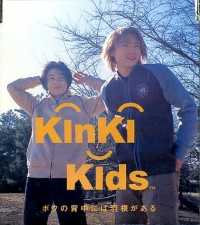Kinki Kids are an exemplary success of the Johnny & Associates agency, a Japanese entertainment industry giant that specializes in creating male pop-culture idols. The two men comprising Kinki Kids were handpicked by the management, educated by Johnny's, and then unleashed upon Japan, first as actors and then as pop singers, whose sweet tunes wooed enough teen girl fans to bring them a place in -The Guinness Book of World Records for their chart achievements. Kinki Kids are Koichi Domoto and Tsuyoshi Domoto -- not related, but both coming from the Kinki region of Japan (hence the band's name). Both born in 1979, they had their showbiz debut as early as 1991, when they appeared as stage dancers in a Hikaru Genji show. Their first magazine and movie stints soon followed, and in 1993 the two teens debuted as W Domoto (aka Double Domoto, later renamed "Kansai Boya," and finally becoming "Kinki Kids" in 1996). Despite playing the Budokan as early as 1994, Koichi and Tsuyoshi were initially marketed as actors, their roles in drama series bringing them nice ad contracts, the first big deal being signed with Panasonic (later in their career they also promoted Nissan, Coca-Cola, and All Nippon Airways). The Domotos also ran their own variety show, Love Love Aishiteru, from 1996 to 2001.
All of this, however, was only a prelude to pop music stardom, the road to which really began in 1997, when Kinki Kids debuted with the single "Glass No Shounen" and the album A. All of their subsequent studio full-lengths were named with letters of the alphabet, comprising a string from A to I and released between 1997 and 2006 (they only skipped 2004). All of these releases topped the Oricon charts, A being the band's best-seller, as it shifted over 1,000,000 units, although the rest also sold between 280,000 and 860,000 copies each. In 1998 both Domotos joined the charity-oriented supergroup J-Friends, which also included members of boy bands V6 and Tokio and collaborated with the likes of Elton John and Michael Jackson (J-Friends folded in 2003, with five albums in their discography). In addition to the stable record schedule and involvement with J-Friends, Koichi and Tsuyoshi continued to work on TV, providing a song for the drama Summer Snow (2000), in which Tsuyoshi starred, and replacing their own show, Love Love Aishiteru, with Domoto Kyoudai (begun in 2001), in which they performed acoustic sets with guest artists. In 2000 Kinki Kids also released KinKi Single Selection, which sold 1,200,000 copies, and debuted as songwriters, composing the single "Sukini Natteku Aishiteku," and in 2001 they made their stab at the Guinness book, replacing Westlife as the band with the largest number of consecutive number one singles after they topped the Oricon charts for the 12th time in a row with their release of "Jounetsu."
In 2003 the two Domotos decided to try their hand at solo work, Tsuyoshi providing the song "Machi" for the drama Yume No California, embarking on a solo tour in 2004, and starring in the 2005 movie Fantastipo with Kokubun Taichi of Tokio, and Koichi starring in the new musical +Shock (which lasted long enough to be renamed +Endless Shock) and releasing Deep in Your Heart/+Million But _ Love in 2006. But they didn't abandon Kinki Kids: the band continued the string of "letter" albums, released two more best-selling collections -- KinKi Single Selection 2 (2004) and 39 (2007) -- and then switched to Greek for their tenth album, Phi (2007), which topped the charts just like its Latin predecessors. In the meantime, Kinki Kids set another record, as their yearly December 31 performance at Tokyo Dome in 2007 became their tenth one in a row (they moved to Osaka for the 2008 New Year, giving up the venue for Johnny & Associates' newer project, News). Their chart presence remained strong: the single "Yakusoku" (2009) became their 28th consequent one to score number one, which constituted yet another record. Alexey Eremenko, Rovi
Source: http://www.starpulse.com/Music/Kinki_Kids-P228310/Biography/
